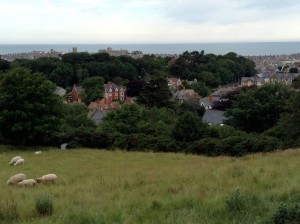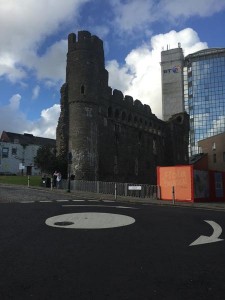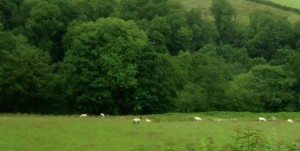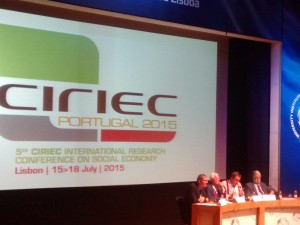Probably the best rural geography conference in Wales
(C’mon, it’s Cymru!)
Guest blog from Phil Mount, Postdoctoral Fellow, Laurier Centre for Sustainable Food Systems
I recently attended Global Challenges and Rural Responses, the 8th Quadrennial UK-US-Canadian Rural Geography Conference in Wales, 6th – 12th July 2015 — co-sponsored by Aberystwyth and Swansea Universities.


This conference brings together the AAG Rural Geography Specialty Group, the CAG Rural Geography Study Group and the RGS-IBG Rural Geography Research Group in an intense, intimate, engaged format, wherein each of the 33 delegates shares their research with the other 32, in sessions that span a week. Presentations are carefully interspersed with field trips highlighting local rural issues—including the dangers of jogging on increasingly congested Welsh roads…

Navigating a Gower traffic jam (photo courtesy Doug Ramsey)
… and evenings capped with copious quantities of socializing.

Enjoying an Y Consti-tutional (photo courtesy Michael Woods)
Themes spanned the transdisciplinary practice of rural geography; the changing nature of rural environmental challenges;

… the new face[s] of exurban development and rural landscapes; the realities of modern farming; the role of alternative food networks and changing practices in shaping the new rural realities; rural responses to global challenges…

(photo courtesy Lisa Harrington)
… and rural gentrification; re-imagining and rebuilding rural communities and rural-urban connections; and understanding the implications of global economic restructuring and collaborative responses in rural communities.

Collaborative responses (photo courtesy Colleen Hiner)
My own research, ‘Scale and the conventionalization of local food’, found many points of interconnection with a series of presentations that mapped the implications of food systems transitions for rural and urban communities, through both local and global food chains. These presentations covered diverse locales—from the South Carolina Lowcountry to Riga, rural Kenya and Hong Kong—as well as diverse subjects, including civic and political engagement, the influence of a legacy of exploitation, political agroecology, cultural firewalls, agriburbia, and measuring the performance of global and local food chains.

Sampling Welsh-Indian fusion at Patti Raj, Swansea (photo courtesy Colleen Hiner)
For me, many of the conference isights coalesced around the diversity of responses in rural regions and landscapes to global realignments, state-level austerity and delegation of services, combined with a growing distortion from wealthy rural amenity investors.

…expressing deep concern for the rural horse-racing industry… (photo courtesy Michael Woods)
Over the course of the week, it became clear that rural geography methodologies are well-positioned to incorporate metrics that recognize complexity, and participatory methodologies that recognize rural positionality;

… to investigate land use policy and struggles;

North Brandon getting the sharp end of the stick… again (photo courtesy Michael Woods)
… to rethink the rural, and rural globalization; to explore governance of rural countryside, environment and community; and to explain the global challenges and rural responses reflected in uneven development, the construction of rural life, and crossing boundaries.

(photo courtesy William Wetherholt)
The conference highlights also included the many forays into the Welsh countryside:

Three Cliffs Bay (photo courtesy Randall Wilson)
Parkmill, Gower (the UK’s first Area of Outstanding Natural Beauty) and Three Cliffs Bay;

 the National Wool Museum, Llandysul, demonstrating the historical and reviving importance of artisanal wool production to the Welsh countryside;
the National Wool Museum, Llandysul, demonstrating the historical and reviving importance of artisanal wool production to the Welsh countryside;

Centre for Alternative Technology, Llwyngwern Quarry, Pantperthog, Machynlleth
… the Centre for Alternative Technology (CAT), with alternative energy and construction displays—including wind, solar, hydro, wood pellets, green roofs, straw bale, packed earth and much, much more;

(photo courtesy Lisa Harrington)
… and Newtown—where stoic field researchers navigated an incredibly serious interactive walk while reflecting on everyday globalization in a small town, using Storymap. And carefully measured the accuracy of random peri-urban birds. Seriously.
It is often difficult to estimate the value that comes from sharing academic work in a conference setting, but i have no doubt that the strength of the bonds created while discussing our work and its implications, across diverse rural Welsh landscapes—and over the occasional pint of Welsh conviviality—will continue to generate fruitful collaboration and useful comparative work on issues that face rural communities, globally, for years to come.
And perhaps a tri-nation croquet grudge match.

(photo courtesy William Wetherholt)




















